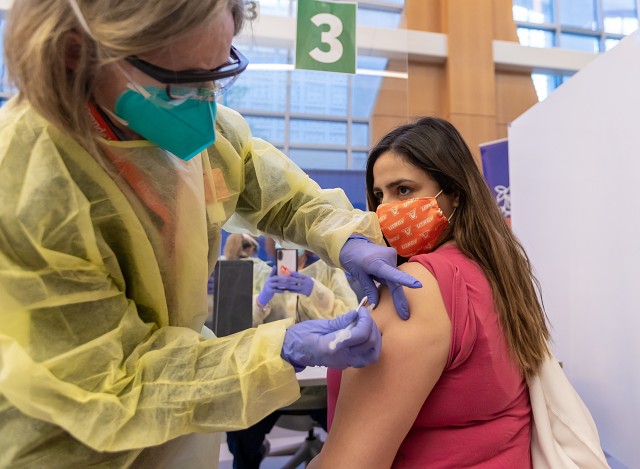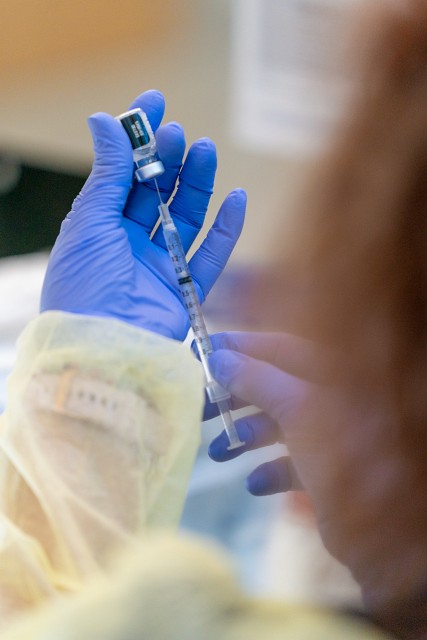UTRGV inoculates first person in the Valley with COVID-19 vaccine
Wednesday, December 16, 2020
Community, Around Campus
By News and Internal Communications
RIO GRANDE VALLEY, TEXAS – As the COVID-19 vaccines rolled out all over the country on Tuesday, UTRGV received 1,950 vaccines, to be administered that afternoon to the university’s frontline workers.
The first person to receive the long-awaited shot not only at UTRGV, but also in the Rio Grande Valley, was Dr. Michelle Lopez, UTRGV School of Medicine associate program director and assistant professor of Internal Medicine.
“I wasn’t nervous, and I will tell you why. Because for the past few months, we have seen how patients can be affected by COVID-19 – and the risks associated with the vaccine are nowhere near as terrible as the things that I have seen in my patients who actually get the COVID-19 infection,” she said.
“I was actually very excited to get the vaccine today and I was very grateful,” she said.
The first COVID-19 vaccine administered in the Valley was by Dr. Linda Nelson, a Doctor of Nurse Practice (DNP), RN, pediatric nurse practitioner and senior director of Clinical Operations for the UTRGV School of Medicine and UT Health RGV.
The vaccine, developed by Pfizer, was granted emergency authorization by the federal government for use on frontline personnel.

At UTRGV, frontline personnel have been identified as high priority because of their heightened exposure to the virus and because of their need to stay healthy to support others as cases surge in the Valley and across the country.
“I think I will feel safer having to go to work and see my patients, and not be afraid now that I am going to get the infection and possibly die and not go home to my family,” Lopez said.
Those in line to receive the initial vaccine at UTRGV already have been notified or will be notified this week. UT Health RGV will administer the vaccine based on guidelines developed by the Centers for Disease Control and Prevention (CDC).
“Over the rest of this week, we will be doing 12-hour shifts in order to ensure that we are able to get the vaccine to our frontline workers and support here at UTRGV,” said Dr. John H. Krouse, UTRGV executive vice president for Health Affairs and dean of the School of Medicine, about the first phase of the vaccine distribution.

UTRGV continues to work closely with the state and federal governments as they make decisions on when the vaccine will be accessible to the general public.
Supplies will increase over time, Krouse said, and it is anticipated the vaccine will be available to all adults later in 2021.
“This is going to be a marathon, not a sprint, as I have said many times. We will likely be advancing our role in the vaccination of the public daily, weekly, monthly, until we really can get a significant portion of the community vaccinated and safe. That likely is going to take a better part of the year,” Krouse said.
Both Krouse and Lopez encourage the community to remain patient and vigilant, and to continue to practice good health and hygiene, wear masks and maintain safe social distance.
“All of these things will remain critical until we get a substantial portion of the population vaccinated,” Krouse said. “But again, that is going to be well into 2021, not in the next month.”
To stay up to date on UTRGV’s COVID-19 efforts and resources, visit www.utrgv.edu/coronavirus.
ABOUT UTRGV
The University of Texas Rio Grande Valley (UTRGV) was created by the Texas Legislature in 2013 as the first major public university of the 21st century in Texas. This transformative initiative provided the opportunity to expand educational opportunities in the Rio Grande Valley, including a new School of Medicine and a School of Podiatry, and made it possible for residents of the region to benefit from the Permanent University Fund – a public endowment contributing support to the University of Texas System and other institutions.
UTRGV has campuses and off-campus research and teaching sites throughout the Rio Grande Valley including Brownsville (formerly The University of Texas at Brownsville campus), Edinburg (formerly The University of Texas-Pan American campus), Harlingen, Weslaco, McAllen, Port Isabel, Rio Grande City and South Padre Island. UTRGV, a comprehensive academic institution, enrolled its first class in the fall of 2015; the School of Medicine welcomed its first class in the summer of 2016, and the School of Podiatric Medicine in the fall of 2022.
